Have you ever wondered what type of people like doing jigsaw puzzles? If so, you’re not alone. Puzzles have a universal appeal, transcending age, culture, and profession. But what draws certain individuals to these enigmatic pastimes more than others? In this blog post, we delve into the fascinating world of jigsaw puzzle enthusiasts, exploring the personality traits that often align with their love for these brain-teasing games.
Jigsaw puzzles are an enduring pastime that challenges both sides of the brain, appealing to those who enjoy the fun of problem-solving coupled with the creative thrill of piecing together a vibrant image. The great puzzle buddies one may find often share a range of common traits, including a fondness for problem solving and a sense of accomplishment upon finding that elusive missing piece. The idealistic nature of some, such as those with an INFJ personality type, may find in puzzles not just a hobby but a profound way to exercise their compassionate vision in assembling the complete picture.
Key Takeaways:
- Jigsaw puzzles offer a harmonious balance of creative and analytical challenges for a diverse range of enthusiasts.
- Puzzle lovers often find accomplishment and stress relief in the immersive activity of piecing together various puzzles.
- The consistent appeal of jigsaw puzzles among different demographics can be linked to their versatile cognitive and therapeutic benefits.
What Is The Name For Jigsaw Enthusiasts
A person ardently involved in puzzle-solving is often referred to as a jigsaw puzzle enthusiast. Another name for such jigsaw enthusiasts is dissectologists. However more formally, in a historical context, those particularly devoted to this hobby were known as members of the “Benevolent Confraternity of Dissectologists.” This term comes from the golden age of wooden jigsaw puzzles, and it commemorates a shared passion for this unique form of entertainment and social interaction. If you find yourself always on the lookout for the next missing piece or are keen on spending time completing different types of jigsaw puzzles, you might be the kind of person to proudly bear the title of a dissectologist.
Who are Dissectologists?
Dissectologists come from all walks of life and all age groups. They share a common love for the challenge and satisfaction that comes from assembling a jigsaw puzzle. Whether it’s a 500-piece depiction of a serene landscape, a 1000-piece image of a famous artwork, or a 3000-piece puzzle of a complex cityscape, Dissectologists relish the task of piecing together these intricate puzzles.
What Kind Of Person Likes To Do Jigsaw Puzzles?
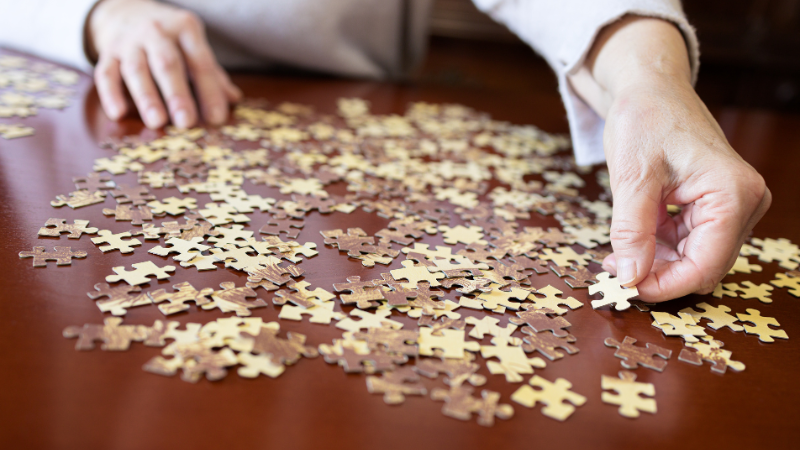
With jigsaw puzzles attracting puzzle lovers of all backgrounds, there are certain personality traits that give some individuals an edge. If you’re the kind of person who enjoys the sense of accomplishment from fitting the last puzzle piece into place, you may share these common characteristics:
Organized Thinkers
A mind geared towards sorting and systematic operation is a common thread among puzzle lovers. They might enjoy maintaining a to-do list and experience satisfaction in checking off tasks, much like fitting in that next piece of a puzzle. For individuals with an innate need for order and organization, jigsaw puzzles present a perfect outlet for their meticulous tendencies. These personality types find joy in sorting and categorizing puzzle pieces, creating a systematic approach to assembling the puzzle. The methodical organizer delights in creating structure out of chaos and finds tranquility in the process of gradually transforming the jumble of pieces into a coherent whole.
Problem Solvers
A proficiency in critical thinking and devising strategies is evident. Jigsaw puzzles are essentially complex problem-solving challenges. They require individuals to analyze, strategize, and make connections between various puzzle pieces to form a cohesive whole. People with a natural inclination for problem-solving, who love tackling intellectual challenges, often find jigsaw puzzles stimulating and gratifying. Their inquisitive nature drives them to explore different strategies, experiment with trial and error, and persistently work towards achieving the final solution.
Visual-Spatial Intellects
Recognizing recurring patterns within the puzzle can speed up the assembly process. A good sense of spatial awareness allows visualizing how pieces fit together and where they might belong in the puzzle. This includes identifying common shapes or color combinations that appear in multiple pieces. Many times puzzle lovers are capable of understanding the size of the puzzle piece and how it fits into the larger picture. An aptitude for visual recognition of different shapes and colors aids in envisioning the complete picture.
Detail-Oriented Individual
Jigsaw puzzles demand patience and a keen eye for detail. Those who possess these traits tend to be drawn to the puzzle-solving process. Patient individuals relish the challenge of fitting together numerous pieces, taking the time to examine and analyze each one. They examine shapes, colors, and patterns to identify where each piece fits in the overall picture. They find satisfaction in the gradual progression towards completing the puzzle and embrace the journey rather than solely focusing on the end result.
The Patient Perfectionist
Jigsaw puzzles demand an ample amount of patience and attention to detail making them an ideal pastime for individuals who possess a perfectionistic streak. They often involve tedious and time-consuming processes of trial and error, especially when working on larger or more complex puzzles. A patient approach helps in persevering through challenging sections.
Those who take pleasure in meticulous tasks, relish organizing intricate pieces, and feel satisfaction in seeing a complete picture emerge tend to gravitate toward jigsaw puzzles. The process of patiently fitting together every puzzle piece mirrors their meticulous approach to life.
Calm and Focused
An interest in jigsaw puzzles can suggest a preference for serene environments over the chaotic outside world. Engaging with the present moment while searching for that missing piece offers stress relief and lowers blood pressure and heart rate, enhancing mental health.
Aesthetic Appreciation
Those individuals who have a keen eye for beauty and detail tend to appreciate the vibrant image brought forth by accurate color prints in different puzzles. This aligns with the idealistic nature of personality types such as INFJ, who seek harmony and beauty.
The Reflective Introvert
Jigsaw puzzles offer a serene and introspective activity, making them particularly appealing to introverted individuals. Those who find solace in quiet contemplation and enjoy their own company often seek refuge in the world of jigsaw puzzles. The introspective nature of jigsaw puzzles allows them to disconnect from external stimuli and find a sense of tranquility. It provides an opportunity for self-reflection, mental relaxation, and a break from the fast-paced world.
Social and Cooperative
While puzzle-solving can be a solitary endeavor, it can also serve as a social activity. You might find enjoyment in assembling puzzles as a way of spending time with family members or friends, uniting over a common goal.
Table 1: Personality Traits Linked to Puzzle Enjoyment
| Trait | Description |
|---|---|
| Patience | Shows tolerance for time-consuming tasks, like searching for the right place for a piece. |
| Attention to Detail | Notices small details and subtle differences between puzzle shapes. |
| Problem-Solving Ability | Applies logic to find solutions step by step, similar to solving number puzzles. |
| Visual-Spatial Skill | Manipulates shapes mentally, beneficial for handling piece puzzles of varied complexity. |
| Calmness | Prefers engaging peacefully with a task, using puzzles as a method for stress relief. |
| Sociability | Values social interaction and cooperation through pursuing a shared activity. |
Remember, these are only some personality traits, and enjoying jigsaw puzzles is an activity people of all ages with a wide range of personalities can appreciate. Whether you’re arranging wooden jigsaws from the 19th century, or modern puzzles, these characteristics might resonate with the type of experiences you seek.
The Psychology of Jigsaw Puzzles and Other Puzzles
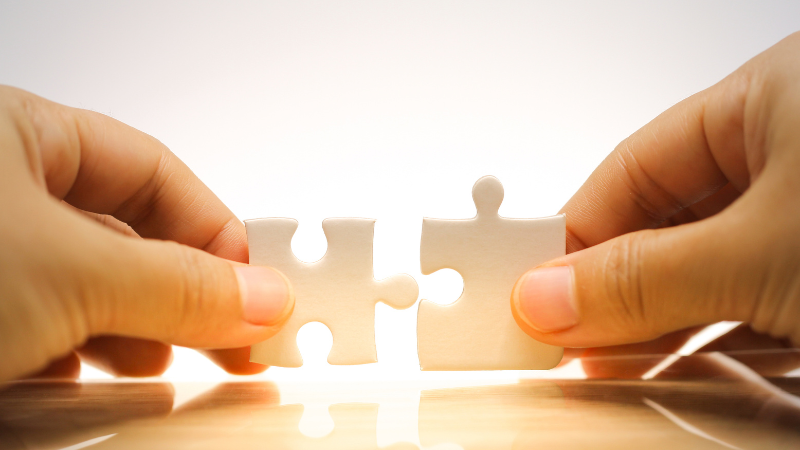
Why Do People Enjoy Puzzles?
Puzzles tap into our innate desire to make sense of the world. They offer a sense of accomplishment when we solve them, and a thrill in the ‘Eureka’ moment when everything falls into place. Moreover, puzzles have a calming effect, providing a welcome distraction from the hustle and bustle of daily life.
Puzzles tap into several psychological factors that make them enjoyable and even addictive for some. Here’s a more detailed look at why people enjoy puzzles:
Cognitive Satisfaction
Puzzles engage our brains in a type of cognitive gymnastics. They require us to use various mental skills, including perception, memory, and problem-solving. When we successfully complete a puzzle, our brains release dopamine, a neurotransmitter that makes us feel good and motivates us to repeat the activity. This sense of cognitive satisfaction is a significant reason why people enjoy puzzles.
The ‘Eureka’ Moment
The ‘Eureka’ moment, also known as the ‘Aha’ moment, is the instant when a solution to a problem becomes clear. This moment is often unexpected and gives us a sense of surprise and pleasure. In puzzles, the ‘Eureka’ moment can occur when we finally find a particular puzzle piece we’ve been searching for. This moment is exhilarating and makes puzzles enjoyable.
The Zone
When working on a puzzle, people often enter a state of flow, also known as being in “the zone.” This state, first described by psychologist Mihaly Csikszentmihalyi, is a state of complete immersion in an activity. When in the zone, people lose track of time and are entirely focused on the task at hand. This state of flow is enjoyable and can be meditative, helping to reduce stress and increase feelings of well-being.
The Challenge
Puzzles offer a challenge that requires mental effort. This challenge is part of their appeal. People often enjoy activities that push them to use their abilities and skills. Overcoming the challenge of a puzzle provides a sense of accomplishment and boosts self-esteem.
Table 2: Key Traits for Jigsaw Puzzle Success
| Personality Traits | Skills | Preferences |
|---|---|---|
| Detailed-Oriented | Problem-Solving | Difficult puzzles |
| Patient | Critical Thinking | Vibrant images |
| Intuitive | Visual-Spatial Reasoning | Extra-Challenging |
| Persistent | Short-Term Memory | Variety in Piece Counts |
| Methodical | Cognitive Abilities | Hands-On Activities |
FAQs
Here, you can find answers to common questions about the type of people who enjoy jigsaw puzzles and why they might be drawn to this immersive activity.
What are the psychological effects of jigsaw puzzle?
Completing jigsaw puzzles can offer a strong sense of accomplishment, with benefits including stress relief and improved mental health. The act of focusing on different shapes and colors to create a larger problem can lower your heart rate and blood pressure, allowing you to concentrate on the present moment.
For older adults, puzzles can even stave off cognitive decline by keeping the mind active. For members of any age group, it’s a great way to sharpen critical thinking and short-term memory through an engaging and fun activity.
What makes someone good at jigsaw puzzles?
Some people excel at puzzles due to their cognitive abilities, experience and practice, problem-solving mindset, attention to detail, and traits such as patience and focus. While natural aptitude may play a role, developing puzzle-solving skills is a combination of innate abilities and the commitment to practice and refine one’s techniques.
Are jigsaw puzzles good for mental health?
Yes, jigsaw puzzles can be beneficial for mental health. Solving puzzles promotes relaxation and stress relief by inducing a state of focused concentration, leading to a temporary escape from daily worries and promoting a sense of calm.
Completing puzzles also releases dopamine, a neurotransmitter associated with pleasure and reward, which can boost mood and contribute to a sense of accomplishment. Furthermore, the meditative nature of puzzle-solving can promote mindfulness, allowing individuals to experience mental relaxation and a break from intrusive thoughts.
What are some of the benefits of doing jigsaw puzzles?
There are many benefits to doing jigsaw puzzles. Some of them are: Mental stimulation, fine motor skills, reducing stress, a sense of accomplishment, and a source of entertainment.
What sort of interests might motivate someone to engage in jigsaw puzzles?
If you’re intrigued by problem-solving and visual-spatial reasoning, you might find jigsaw puzzles appealing. Puzzle lovers often enjoy the systematic approach of sorting pieces and use their acute sense of detail to piece puzzles together.
How does puzzle-solving ability correlate with particular personality traits?
Your puzzle-solving skills might reflect certain personality traits. For example, the Myers-Briggs personality type INFJ is reputed to have an idealistic nature and strong problem-solving abilities. Such personality tests suggest that logical, patient individuals with a propensity for intensive focus, like those with the INFJ or ISFJ personality types, may enjoy and excel at piecing together even the most difficult puzzles.
Additional Reading
Conclusion
While jigsaw puzzles can captivate people from all walks of life, certain personality traits often align with a love for these brain-stimulating games. The patient perfectionists, curious problem-solvers, detail-oriented, methodical organizers, and reflective introverts tend to find solace, joy, and satisfaction in the intricacies of jigsaw puzzles.
Whether it’s the challenge of problem-solving, the need for order, or the desire for a tranquil and introspective activity, these personality types discover a unique affinity with the world of jigsaw puzzles. So, the next time you encounter a jigsaw puzzle enthusiast, consider the traits they may embody and appreciate the diverse ways in which puzzles can captivate our minds and bring us together.
Do you think you fit one of the personalities drawn to jigsaw puzzles? Please comment below.



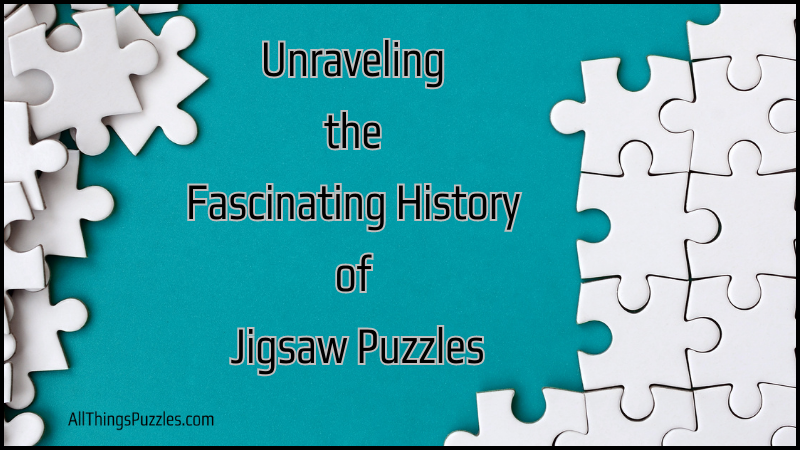



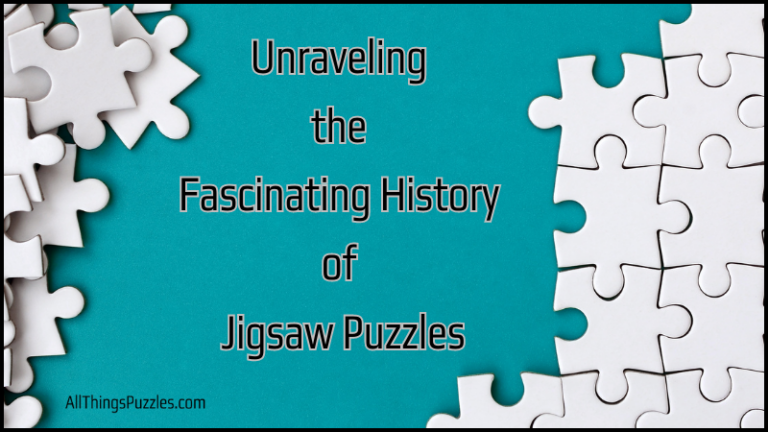
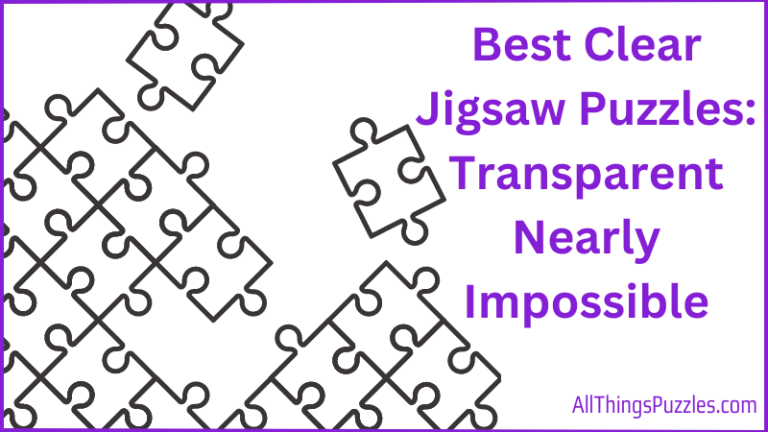

I ordered my first puzzle when we went into lockdown with the pandemic. True to my nature of go big or go home, I ordered a 2000 piece puzzle and I’ll admit that as we began, I thought “what was I thinking?” Four years and literally thousands of puzzle pieces later, I am still at it. I just love it. It’s my happy place.
Dear Lidia,
Thank you so much for sharing your experience with us! It’s amazing to hear how you dove into the world of puzzles with a 2000-piece challenge during the pandemic and have continued to find enjoyment with puzzles these past four years. Finding your “happy place” speaks volumes about the joy and satisfaction you find in this hobby.
Keep on puzzling and finding that happiness!
Thank you again for sharing your story with us. It’s comments like yours that remind us of the simple joys in life and the power of finding solace in the things we love.
Happy puzzling!
Warm Regards,
Debbie